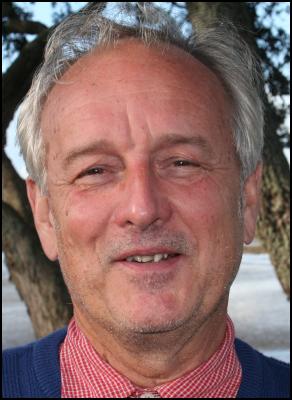NZers misled by unfounded sea level claims
New Zealanders being misled by unfounded claims about sea level rises

Click to enlarge
Media release (immediate) 6 August 2007
New Zealanders being misled by unfounded claims about sea level rises
New Zealanders should not be misled by unfounded claims about dangerous rises in sea levels says Professor Nils-Axel Mörner, a leading world authority on sea levels and coastal erosion. He in a short visit to this country and he has addressed audiences at Victoria, Auckland and Waikato Universities.
Until his retirement, Professor Mörner was head of the Department of Paleogeophysics & Geodynamics at Stockholm University. From 1999 to 2003, he was president of the INQUA Commission on Sea Level Changes and Coastal Evolution. INQUA, the International Union for Quaternary Research, was founded in 1928 to bring together scientists in 35 countries to study the environmental changes that occurred during the last two million years and to interpret the relevance of those changes to present day climate processes and environments.
Professor Mörner has published a booklet entitled "The Greatest Lie Ever Told," to refute claims of catastrophic sea level rise. "When we were coming out of the last ice age, huge ice sheets were melting rapidly and the sea level rose at an average of 1 metre per century. If the Greenland ice sheet stated to melt at the same rate - which is unlikely - sea level would rise by less than 100 mm - 4 inches per century. So the rapid rise in sea levels predicted by computer models simply cannot happen."
The booklet refers to observational records of sea levels for the past 300 years that show variations - ups and downs, but no significant trend.
Actual records of tide gauges at Tuvalu for the last 25 years, and at Vanuatu since 1993 show no traces of a sudden rise in their sea levels.
"This ought to be of relevance to New Zealanders in view of the false claims by Al Gore in his film 'An Inconvenient Truth' that South Pacific islands are 'sinking' and their in habitants have had to flee to your very own country. You know there has been no such evacuation. I can assure you there have been no rises in sea levels, so you should ask yourselves how much else of what Gore says is similarly false," said Professor Mörner.
"There have been some problems with erosion from recent cyclones and salt water intrusion on Tuvalu. It seems that Japanese owned pineapple plantations have extracted too much freshwater from the ground, causing an inflow of sea water and destruction of the underground freshwater reservoirs."
In 2000, Professor Mörner led a team of INQUA sea level specialists to investigate claims of rising levels at the Maldive Islands in the Indian Ocean. "What we found was that sea levels were relatively stable between 1790 and 1970, but that around 1970 there was a fall in sea levels of 20 to 30 cm, and since then the levels have remained stable."
Professor Mörner that scientists and policy-makers addressing the way that climatic changes may affect future world living standards and patterns should be guided solely by actual observations and the lessons of the world's climate history. They should stop relying on computer models that have failed to make accurate predictions even a few years ahead.
"Right now, we are at a peak of the current sunspot cycle, and so there is more risk of cooling of the earth's atmosphere than there is of any warming, let alone catastrophic warming. There is absolutely no justification for burdening people with the huge financial costs of seal level rises that cannot happen, carbon taxes or emission charges, or for placing unwarranted restrictions on the way we live our lives.
"Instead, people in positions of political authority should be paying greater and more urgent attention to clear and present problems such as earthquakes, tsunamis, clean air, clean water and the elimination of diseases such as malaria and AIDs," said Professor Mörner.
ENDS
628 words
Note to Editors:
Professor Mörner is delivering public lectures at:
Auckland: Room 3.401, School of Engineering, University of Auckland, Symonds Street, at 6 p.m. tonight, Monday 6 August.
Hamilton: Lecture Theatre SG.01, Waikato University from 7-9 pm on Tuesday 7August
Media welcome.


 Alcohol Beverages Council: Turning The Tide - New Zealanders Unite To Curb Harmful Drinking
Alcohol Beverages Council: Turning The Tide - New Zealanders Unite To Curb Harmful Drinking University of Auckland Business School: Economists Urge Action To Prevent ‘AI Poverty Traps’
University of Auckland Business School: Economists Urge Action To Prevent ‘AI Poverty Traps’ Bill Bennett: Australian warship takes rural fixed wireless broadband offline
Bill Bennett: Australian warship takes rural fixed wireless broadband offline NZ Telecommunications Forum - TCF: New Zealand Is Saying Goodbye To 3G: Are You Ready For The Change?
NZ Telecommunications Forum - TCF: New Zealand Is Saying Goodbye To 3G: Are You Ready For The Change? NZ Post: Mānawatia A Matariki - NZ Post Stamps Look To The Stars Ahead Of The Māori New Year
NZ Post: Mānawatia A Matariki - NZ Post Stamps Look To The Stars Ahead Of The Māori New Year Waipa Networks: Cambridge Is Open For Business With $45M Energy Boost
Waipa Networks: Cambridge Is Open For Business With $45M Energy Boost


